Valerie Gibbons
“I call myself a professional patient,” says Valerie Gibbons, “I had to be this way because after transplant, so much was undiagnosed, misdiagnosed or unknown.”
In the wake of receiving a stem cell transplant for acute myeloid leukemia (AML) in 2007, Valerie, who currently lives in Wisconsin with her emotional support cat, Thea Dora, named after her caregiver, Ted, suffered a host of post-transplant health challenges. “I don’t have a pretty story to share, I have a classic survival story.” 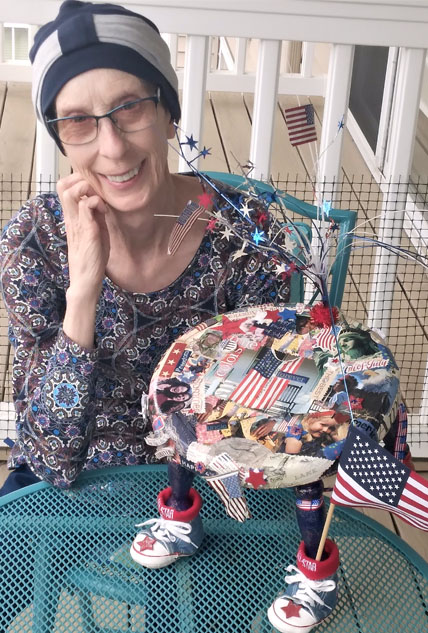
Most observers would have a hard time classifying anything about Valerie’s story as “classic.” Rather, her survival seems to stem from exceptional qualities: piercing intelligence, tenacious dedication to communicating her needs, and a special faith in the power of humor to heal. These gifts, coupled with Valerie’s realism and the problem-solving prowess she and Ted share, have steered her safely through a post-transplant gauntlet which includes, by her tally, “steroid-induced osteoporosis, depression and psychosis, hyperthyroidism, diabetes, dental issues from severe dry mouth, cataracts and other ocular issues. I was declared legally blind, from severe dry eye.”
Surveying the years since her transplant, Valerie takes a deep breath, “So many things went wrong. My quality of life was so diminished that in order to keep going, I had to become an advocate for my own wellbeing.”
“Ted and I became medical sleuths. He is a researcher… he has a PhD so he could interpret the statistics. Together we delved into medical journals, and then we emailed or called the principal authors who were typically willing to talk to us about the issue, or refer us to local doctors who might help. I’m alive because of our diligence. And Ted’s caregiving.”
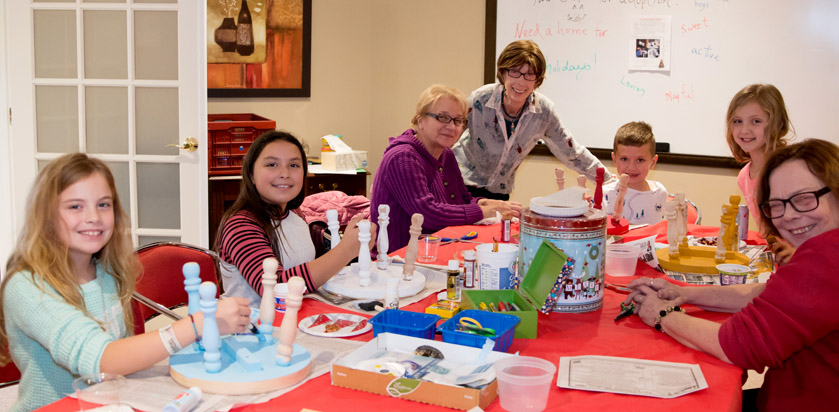 Valerie is now determined to transmit their hard-won wisdom to the next wave of survivors. “I really want to model for patients that they can be their own advocates. They can start with Google Scholar and read the abstracts or discussions, print the article, and take it to the doctor to open up a discussion.”
Valerie is now determined to transmit their hard-won wisdom to the next wave of survivors. “I really want to model for patients that they can be their own advocates. They can start with Google Scholar and read the abstracts or discussions, print the article, and take it to the doctor to open up a discussion.”
Valerie’s vision for improving health, post-transplant, extends beyond advocacy, to the healing properties of humor, which she’s experienced personally. A few years after transplant, she was sitting in a recliner she called her “sick chair,” idly reading a women’s magazine, when she spotted an article on decoupage and thought: “I can do that!”
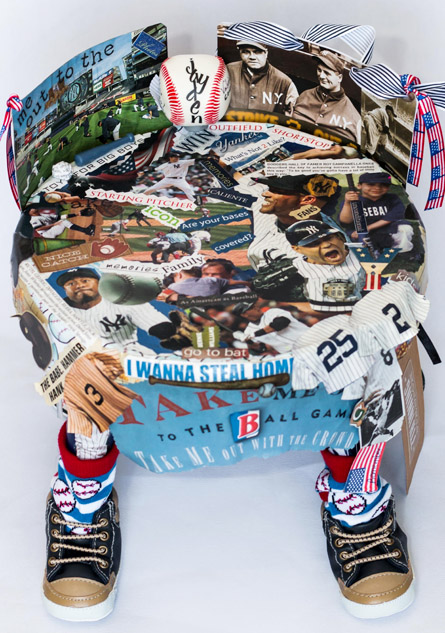 She happened to have bought a footstool and decided to decorate it for her sister to sit on when weeding the flower patches around her house. That first decoupage piece fittingly expressed a garden theme. When she completed the piece, Valerie thought it would be funny to outfit the stool in garden boots.
She happened to have bought a footstool and decided to decorate it for her sister to sit on when weeding the flower patches around her house. That first decoupage piece fittingly expressed a garden theme. When she completed the piece, Valerie thought it would be funny to outfit the stool in garden boots.
“In a Dollar Store, I actually found baby garden boots. I popped them onto the footstool and just about fell out of my chair laughing. I discovered right then how much humor could help me heal.”
So began a five-year "mission of mirth,” during which time Valerie made footstools on themes ranging from Wizard of Oz to Safari to Snow Queen (see examples at footsiestools.org/gallery).
“They were whimsical,” Valerie says, “I formed a nonprofit to share the joy of whimsy. My mission was to uplift people and let them know that despite what they’d been through, there was a happy soul in there somewhere, I spelled it s-o-l-e. Eventually, I joined the Association for Applied and Therapeutic Humor, which promotes humor in all aspects: levity in the workplace, mental health settings, in the schools, in all walks of life. That’s AATH.org.”
Over time, these unique art pieces revealed healing aspects that transcended humor. “The more I did it, the more I loved piecing things together,” Valerie says. “I came to understand it was like piecing together fragments of my own experience.” 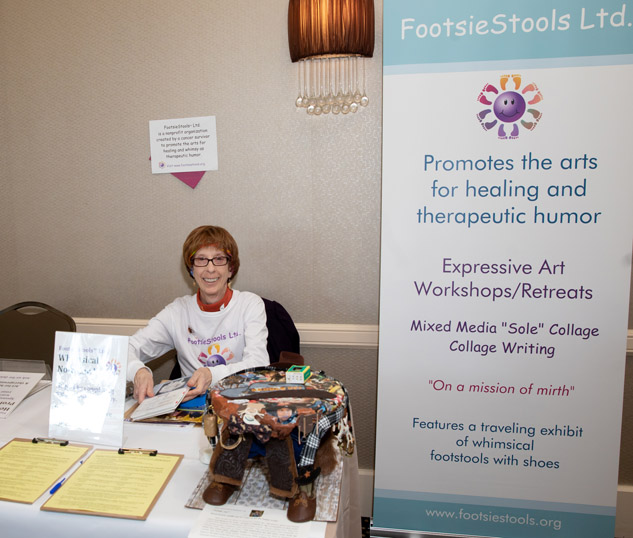
Sometimes the craft of layering a piece with images took special patience. Valerie describes one piece on which the collage papers buckled because she had used the wrong adhesive.
"I had to do surgery with an Exacto knife to fix it. It had visible scars from the redo, so I created a story about the stool, describing how ‘she’ was still beautiful despite her scars'." When the stool was displayed, Valerie remembers, “A woman came up to me in tears. She’d had breast cancer, she had scars and she said, ‘this is so healing to see’.
Valerie, the ‘classic’ survivor, traversed obstacle after obstacle over the 16 years since her transplant and was helped by honoring others' journeys. Reflecting on her own journey, Valerie says, “Before all this I was healthy, ate an organic diet and swam three times a week. I went from that vitality to a hospital regimen that included 36 drugs a day. The fact that I’m even alive is a testament to something.” She pauses before continuing, “But the people who don’t make it fought just as hard…”
Even while acknowledging her strength, Valerie retains a sensitivity to others, and an understanding that grace factors into survival. And, at the same time, she is clear-eyed on what’s made the most significant difference.
“What kept me going was I wanted to live to see the beauty of the natural world. I am an earth girl. I’m totally in love with the earth and all its creatures (except centipedes!). “
“During my first hospitalization I was in total isolation. Then, after two and a half months, they let me leave the room. I asked my mother to take me down to the healing garden. She pushed me out, and it was the first time I’d been outdoors. It was a little healing courtyard with fountains, trees, birds, and flowers, and I started to cry. I could still make tears then, I can’t now. It was one of the last times I cried with joy to see the beauty of nature. And I said to myself, this is what I will live for.
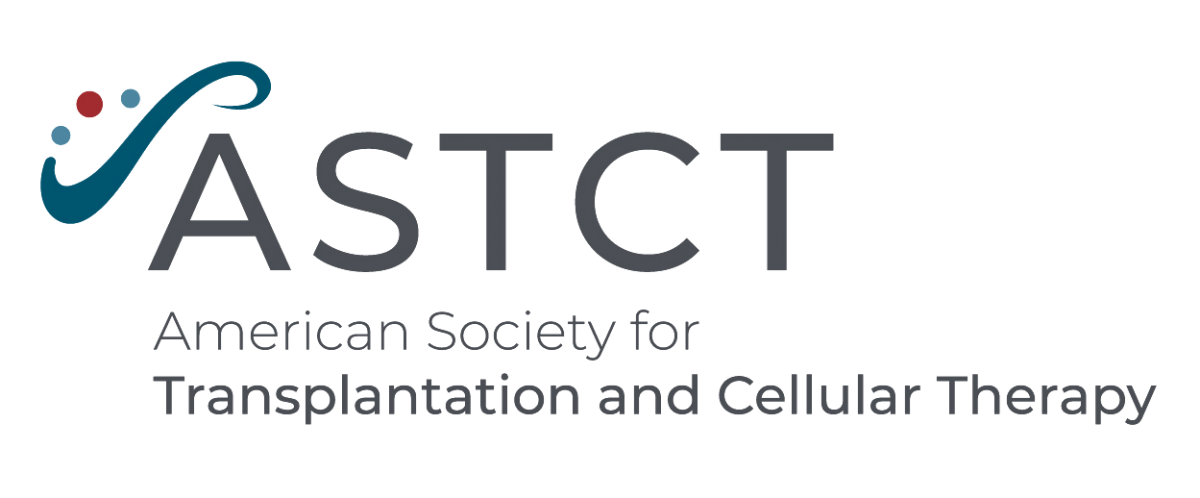
The American Society for Transplantation and Cellular Therapy (ASTCT), formerly known as the American Society for Blood and Marrow Transplantation, is a professional society of more than 2,200 healthcare professionals and scientists from over 45 countries who are dedicated to improving the application and success of blood and marrow transplantation and related cellular therapies. ASTCT strives to be the leading organization promoting research, education, and clinical practice to deliver the best, comprehensive patient care.
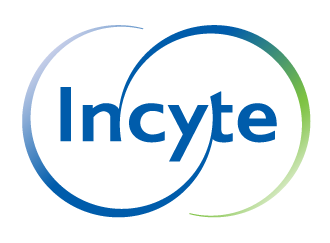
Incyte is a Wilmington, Delaware-based, global biopharmaceutical company focused on finding solutions for serious unmet medical needs through the discovery, development and commercialization of proprietary therapeutics. For additional information on Incyte, please visit Incyte.com and follow @Incyte.